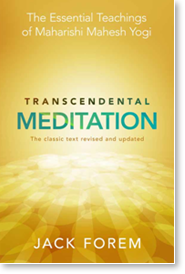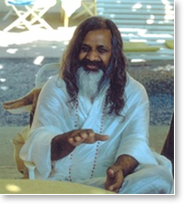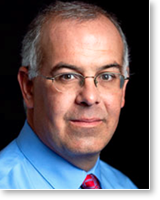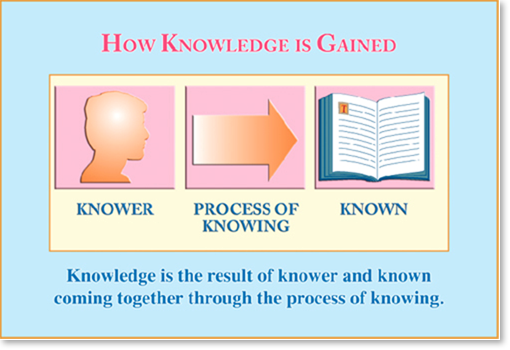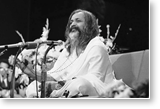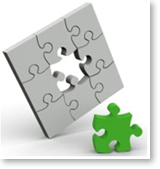 The following is an excerpt from the book, Transcendental Meditation: The Essential Teachings of Maharishi Mahesh Yogi, by Jack Forem.
The following is an excerpt from the book, Transcendental Meditation: The Essential Teachings of Maharishi Mahesh Yogi, by Jack Forem.
THE PURPOSE OF EDUCATION
The key to what education can be is embedded in the word itself, which comes from the Latin root educere, “to bring or lead out.” It implies a bringing out and developing of an individual’s full capacity for living.
“Instruction is the process of pumping information into the person; it literally means ‘to build into’; whereas education means the process of nurturing or rearing,” wrote anthropologist and author Ashley Montagu in The Direction of Human Development. “We must recognize that today, in the western world, we have far too much instruction and all too little education. We are far too busy filling up the young with what we think they ought to know, to have much time left over for helping them become what they ought to be.” Or, in the words of the distinguished American educator Robert M. Hutchins, “The aim of education in an age of rapid change should be to do what it can to help everybody gain complete possession of all their powers. . . . this is what we ought to have been doing all along.”
In Science of Being and Art of Living, Maharishi Mahesh Yogi offered this definition:
“The purpose of education is to culture the mind of a man so that he can accomplish all his aims in life. Education, to justify itself, should enable a man to use the full potential of his body, mind and spirit. It should also develop in him the ability to make the best use of his personality, surroundings, and circumstances so that he may accomplish the maximum in life for himself and for others.”
Considering how far we are from accomplishing these basic and sensible aims, and that “there are tremendous latent possibilities that are never unfolded by young people during their student life,” we can see why there is such widespread dissatisfaction with education. Students are being asked to absorb and produce more, but as the demands on them increase, what is being offered to actually increase their abilities, to provide added intelligence, insight, or emotional stability? What is being done to help them discover and create meaningful values and goals, and a direction in life? Shouldn’t education encourage and support students to discover and become who they really are, and prepare them to confront and solve the problems and answer the questions that life poses?
As New York Times columnist David Brooks recently noted, “Modern society has created a giant apparatus for the cultivation of the hard skills,” such as rational, analytic thinking, but it has failed to help students develop their moral and emotional faculties. Children learn to “jump through a thousand scholastic hoops. Yet by far the most important decisions they will make are about whom to marry and whom to befriend, what to love and what to despise, and how to control impulses.” We do a good job of teaching technical skills, says Brooks, “but when it comes to the most important things, like character, we have almost nothing to say.”
Broadly speaking, education has two main purposes or functions: the cultivation and development of the individual, and the improvement of society. Which of these two goals is most important? It is difficult to say, for they are mutually dependent. The better the individual person, the better society will be. What, after all, is a society, if not a group of individuals? And a better society will offer more opportunity for individual development. However, the very basis of a democratic society, that which distinguishes it from a collective or totalitarian system, is an insistence on the preeminence of the individual. A truly democratic society strives to create the proper conditions—political, economic, educational—for the full development of every person.
THE MISSING ELEMENT
If the outer structure and expression of life is based on the inner state of consciousness, and we build our lives and our civilizations based on who we are inside, why is it that we have tended to turn outward, dealing always with structures and forms, handling problematic situations with whatever capabilities we have, instead of attempting to improve our capacity for effective, intelligent action? If it is so vital and crucial, why has inner development—the most fundamental aspect of education and the basis of all success and happiness in life—been so neglected?
Educational systems, wrote Dr. Michael Dillbeck and Dr. Susan Levin Dillbeck, “have organized formal schooling without complete knowledge of the creative potential of the individual or how to develop it.” People are thus deprived of the satisfaction, as well as the competitive advantage, that they could enjoy from a more complete unfoldment of their capabilities, and society is deprived of the greater contributions they might make.
“An educated person,” I once heard Maharishi say, “is expected to be proficient in every phase of his life. Yet time doesn’t allow all disciplines and aspects of life to be mastered.” The pace and style of living today necessitate specialization: no one can learn everything and be an expert in all fields of knowledge. Thus, people complete their basic education with only partial knowledge and partial competency. What is needed, he said, is “the knowledge to develop a fully integrated individual, whose mind, body, intellect, and behavior are in perfect accord with all the laws of nature.”
Einstein recognized this decades ago. “The school should always have as its aim,” he said, that the student “leave it as a harmonious personality, not as a specialist. . . . The development of general ability for independent thinking and judgment should always be placed foremost.”
What has been missing from education, then, is an effective methodology to upgrade our capacity for creative and humane action. We have known no successful way to sharpen the mind and expand the ability of the heart to express love and human kindness, and to help men and women attain full use of their potential for dealing effectively with all situations of life. The solution to the problems confronting people in every nation on Earth lies in the same place as the source of the problems: those individuals who make up the society. If we do not experience a significant deepening and expansion of consciousness, the nature of the problems may change, but we will continue to create many more. From this perspective, finding a way to unfold the inherent potential of every person is the greatest need of our age, and it is the legitimate province and fundamental function of education.
THE THREE FIELDS OF KNOWLEDGE
Education is generally considered to be about knowledge: acquiring it and learning how to apply it. Although we rarely think about it this way, knowledge has three ever-present components:
• The knower or learner
• The known, the object or focus of attention, the thing to be learned
• The process of knowing that connects the knower with the known
Educators have focused almost entirely on only one of these: the object to be known. Students at every level of education, from kindergarten to postdoctoral studies, spend their time learning about all kinds of things: the alphabet, algebra, architecture, poetry, mitochondria, statistical analysis, and so on. But how much time is allotted to learning about the self, the mind that learns and knows?
Objects of knowledge abound; every few years, the “knowledge explosion” doubles the amount of information available to us. But the mind, the container of information or knowledge, the subjective side of the equation, does not expand at an equivalent rate. For us not to be overwhelmed by the avalanche of information that falls on us every day, an increase in subjective development is imperative. The knower has to grow in capacity and capability.
Addressing the 1973 annual conference of the American Association for Higher Education, Maharishi challenged the large hall filled with educators by saying, “Education has been facing problems for decades, for centuries. It has not been satisfactory.” But he did not dwell long on the problem. “What is lacking should be obvious to all,” he said. “What the present system of education provides is knowledge of the object; what it misses is knowledge of the subject, the knower.”
To Maharishi, ‘knowledge of the knower’ includes more than being aware of one’s thoughts and feelings. It refers to the individual’s direct subjective experience of the full range of his own consciousness, from the most active surface level of thought to the deepest inner silence of transcendental consciousness, the field of the total potential of the mind.
The full range of our individual consciousness includes (1) the outermost level of the senses, which bring in information; (2) the active, surface, thinking level of the mind that processes information from the senses and from experience of all kinds; (3) the more quiet or settled level of the intellect that is responsible for making distinctions and decisions; (4) feelings, which not only play a subtle but powerful role in decision making, but also catalyze creativity and add a dimension of richness to experience and relationships; (5) intuition, which is our way of directly knowing things that the senses cannot deliver and the mind and intellect might fail to grasp, but which are frequently the source of important personal and scientific discoveries; and (6) the ego or sense of self or identity that underlies all the other layers of the mind.
All these are enlivened and strengthened through the simple procedure of transcending, during which one consciously traverses the entire depth of the mind, fully awake and alert, like a diver fathoming the depths of a lake. Honing and refining these mental faculties strengthens both the knower, and the process of knowing or gaining knowledge, and results in a more clear and complete knowledge of the objects of knowledge.
Developing the full powers of the knower, is the only sensible basis for education.




